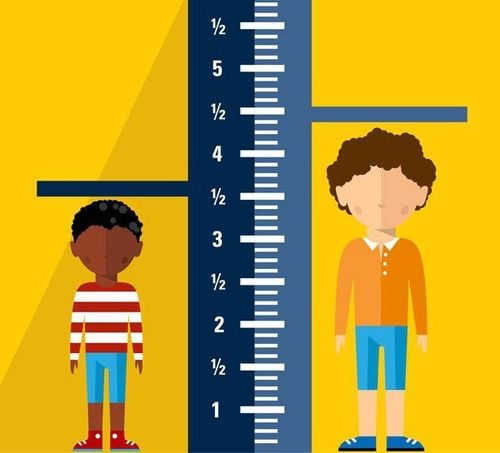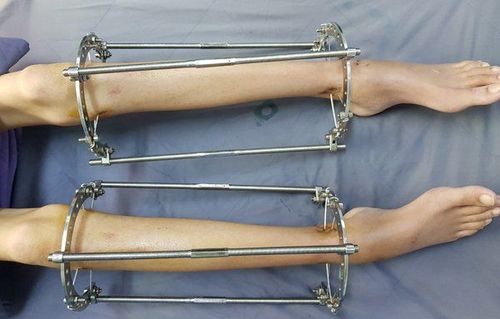This article is reviewed by Master, Doctor Nguyen Minh Tuan, a pediatrician in the Pediatrics - Neonatology Department at Vinmec Danang International General Hospital.
Many people are dissatisfied with their height and are eager to find ways to improve it. Some people believe that good nutrition or special exercises can increase height in adulthood. This article will discuss whether it is possible to increase height after the age of 18.
1. Factors Determining Your Height:
Before discussing whether height can change in adulthood, it's important to consider the factors that determine height in the first place. The easy answer is genetics, but that's not the whole story. Studying twins is one way that scientists determine the influence of genetics on body height. Generally, height in twins shows a high correlation. This means if one of the twins is tall, the other is also likely to be tall. Based on studies in twins, it is estimated that 60-80% of height differences among people are due to genetics, while the remaining 20-40% is attributed to environmental factors such as nutrition. A study involving 18.6 million people provided insights into height changes over the past century. The results indicated that the average height in some countries increased between the two time points of 1996 and 1989, primarily due to improved nutrition in these countries.
2. Height almost never increases after the age of 18:
Even with a healthy diet, the height of most people will not increase after the age of 18 to 20. The reason why height stops increasing is because the bones, specifically the growth plates in the bones, stop being active. The growth plates, also known as epiphyseal plates, are specialized areas of cartilage near the ends of long bones. Height increase is primarily due to the elongation of long bones as the growth plates remain active. Near the end of puberty, hormonal changes cause the growth plates to harden and the elongation process of the bones to cease.
Growth rates are most pronounced around the age of 16 for females and between 14 to 19 years for males. Daily activities impact on the cartilage and fluids in the spine, and lead to a slight decrease in height throughout the day.

3. There are no exercises or stretching techniques that can make you taller:
Many people believe that activities such as hanging, climbing, using inversion tables and swimming can increase height. The truth is, there is no evidence to support these claims.
Although your height changes slightly throughout the day due to the compression and decompression of the cartilage discs in your spine. By decompressing the discs, some of these activities can temporarily increase your height to a very small extent. However, this is not a real change in height, as any changes are quickly reversed. This loss of height during the day can be up to about half an inch (1.5 cm). Some studies showed that the height of the discs in the spine can continue to increase through young adulthood, but the impact on overall height is minimal.
4. Doing exercise may not decrease height:
Many people worry that exercise, especially weightlifting, can harm their height. These are common concerns among children and teenagers who have not yet closed their growth plates.
The cartilage in growth plates is weaker than the mature bone that forms during adulthood and can be more prone to damage. However, most studies indicate that weightlifting is safe and beneficial at all ages, as long as it is appropriately supervised. Evidence from research has shown that weightlifting in children and teenagers does not cause issues with stunted physical development.
A study asked 500 sports medicine experts whether weightlifting should be avoided until a person finishes growing. 85% of the experts stated that it is not necessary to avoid weightlifting, and only 10% believed it is best to avoid it. Additionally, other research indicates that the main concern regarding weightlifting injuries is the lack of supervision or improper use of equipment.
In adults, the growth plates have closed and become stronger compared to childhood. Therefore, the risk of damaging the growth plates is not a major concern. Weightlifting can cause slight compression of the spinal discs in adults, but this is reversible and similar to normal daily activities. A potential cause for concern is injuries such as herniated discs. In such cases, the size and health of the spinal discs can be compromised, potentially leading to a slight decrease in height.
5. A healthy lifestyle before the age of 18 can help you reach your height potential:

Although you may not significantly change your height as an adult, there are things you can do to maximize your height potential during your teenage years.
Overall, you must ensure that you are eating enough and not lacking in any vitamins or minerals. While many children eat enough (or even too much), the quality of their diet is often poor. As a result, many people are deficient in crucial nutrients for bones and the body, such as vitamin D and calcium. Dietary calcium alters hormone production in ways that benefit bones, and vitamin D can also improve bone health.
An excellent way to combat nutrient deficiencies and promote optimal bone growth is to increase your intake of fruits and vegetables. Consuming enough protein is also essential for bone health, although some people have questioned whether eating a lot of protein could harm bones. However, a large analysis has shown that higher protein intake does not harm bones; instead, it benefits the bone density of the spine. One way to increase your protein intake is to aim for at least 20g of protein per meal. Foods such as eggs, dairy products, soy, and other legumes are also good sources of protein for the body.
Although proper nutrition during childhood is essential for reaching maximum height, there may be differences between males and females. Some studies have shown that environmental factors, such as nutrition, may play a larger role in determining height for females compared to males. This may be partly due to differences in access to food and healthcare, or higher rates of osteoporosis in females. Other lifestyle choices, such as not smoking, can also be beneficial for your height during the growth period.
6. Some medical conditions can cause an increase in adult height:
Although most adults will not grow taller after the age of 18 to 20, there are exceptions to this rule. Firstly, the closing of growth plates can be delayed in some individuals. If the growth plates remain open during the ages of 18 to 20, which is uncommon, height can continue to increase.
Secondly, some individuals suffer from gigantism. This condition causes excessive growth, often due to the overproduction of growth hormone (GH). However, these individuals usually only continue to increase in height until their growth plates close around the age of 22.
Overall, these conditions can increase height until the growth plates close.
7. What can you do for your height?
If you are an adult who is not satisfied with your height, you can try the following methods:
• Practice good posture: Poor posture can steal several inches of height from anyone.
• Try high heels or insoles: Choose shoes with higher heels or place insoles in your shoes to add a few extra inches of height.
• Build muscle to look and feel stronger: Overall, if you feel small, lifting weights to build muscle can make you appear more muscular and confident.
While these simple strategies can be helpful, some people resort to more drastic measures, such as medical treatments or procedures. Some of these procedures involve lengthening the bones of the legs. However, due to the invasive and expensive nature of these activities, many people do not choose such drastic measures. These procedures are even banned in some countries. Some people opt to improve their height through growth hormone (GH) therapy. Although GH can improve height in children with abnormal growth, the benefits of this treatment in adults are uncertain.
Ultimately, you should seek to accept your height rather than consider more drastic measures.

8. Accept your height:
Although you may not be able to increase your height as desired, there are things you can do to help yourself accept your current height. You can be happy and successful regardless of your stature. Make a list of your best qualities, both physical and non-physical, that can help improve your outlook. Additionally, you can focus on other areas of self-improvement.
Height is largely determined by genetics, and most people will not grow taller after the age of 18. However, proper nutrition during childhood and adolescence can help you reach your maximum height potential. If you are not satisfied with your height, you might want to consider some simple strategies to look and feel your best. These can include good posture, wearing shoes with heels, or lifting weights to build muscle. Moreover, focusing on your strengths and other areas of self-improvement can help you not to focus on your height. Ultimately, you cannot change the hand you are dealt in life, but you can find ways to make the most of it.
Please dial HOTLINE for more information or register for an appointment HERE. Download MyVinmec app to make appointments faster and to manage your bookings easily.














